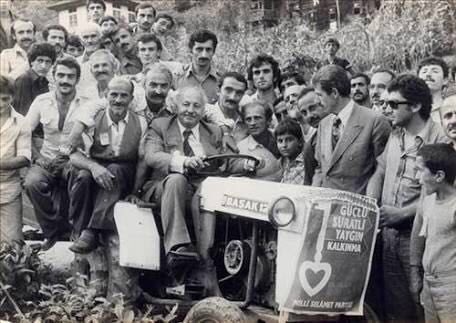![Necmettin Erbakan: Why Turkey honors him today In this April 10, 2009 file photo, former Prime Minister Necmettin Erbakan speaks at a news conference in Ankara, Turkey [Photo/Burhan Ozbilici/AP]](https://i0.wp.com/www.aljazeera.com/mritems/imagecache/mbdxxlarge/mritems/Images/2018/2/27/6faac8e8258d4b4a99914d422b60e28f_18.jpg?w=640&ssl=1)
Turkey’s prime minister on Tuesday commemorated the seventh anniversary of the passing of the country’s former Prime Minister Necmettin Erbakan, who passed away on February 27, 2011.
Speaking to his party’s parliamentary group, Binali Yildirim hailed Erbakan as “a dignified politician”, one who never used “the language of hate” but instead favoured “the language of affinities”.
“He brought soft words and a smiling face to politics,” said Yildirim.
Yildirim recalled how, at rallies, Erbakan called on people to swear by God to stand against people who harmed Turkish law or fellowship.
Erbakan had to resign his post in 1997 – after less than a year in office – in what became known as the “post-modern coup”.
In 1997 the Turkish military issued a series of “recommendations”, which the government had no choice but to accept. Erbakan agreed to a compulsory eight-year education programme (to prevent pupils from enrolling in religious schools), a headscarf ban at universities, and other measures. He was then forced to resign, and his government collapsed and was replaced by a new civilian government.
The military had held a meeting of the National Security Council to discuss their concerns with the government’s programme on February 28, 1997, after which their recommendations were issued.
Erbakan’s Welfare Party was outlawed in 1998, and he was banned from politics for five years.
National Vision Movement
Erbakan, who was popularly known as the “hodja”, or Muslim scholar, brought his “National Vision Movement” ideology to Turkish politics in the 1990s. Former members of his party, including current prime minister Recep Tayyip Erdogan, would eventually go on to found the Justice and Development (AK) Party.
Anchoring his political viewpoint in ethics and spirituality, Erbakan led the way for many statesmen and civil servants who followed, including President Recep Tayyip Erdogan.
Erbakan supported increasing national production and the industrialisation of Turkey.
He also envisioned a common-market organisation made up of mainly Muslim-populated countries who would have similar trade goals and policies. That came to life with the establishment of D-8 Organization for Economic Cooperation in 1997, with the participation of Iran, Pakistan, Bangladesh, Malaysia, Indonesia, Egypt and Nigeria.
The D-8 was officially established at an Istanbul summit in June 1997, in another element of Erbakan’s enduring legacy.
SOURCE: ANADOLU NEWS AGENCY



























